Spring IOC源码深度剖析
1. spring源码构建
- 本地安装gradle,配置环境变量
- GitHub下载源码
- idea 导入工程
- 编译⼯程(顺序:core-oxm-context-beans-aspects-aop):⼯程—>tasks—>compileTestJava
2. Spring IoC容器初始化主体流程
2.1 Spring IoC的容器体系
IoC容器是Spring的核⼼模块,是抽象了对象管理、依赖关系管理的框架解决⽅案。Spring 提供了很多的容器,其中 BeanFactory 是顶层容器(根容器),不能被实例化,它定义了所有 IoC 容器 必须遵从的⼀套原则,具体的容器实现可以增加额外的功能,⽐如我们常⽤到的ApplicationContext,其下更具体的实现如ClassPathXmlApplicationContext 包含了解析 xml 等⼀系列的内容,AnnotationConfigApplicationContext 则是包含了注解解析等⼀系列的内容。Spring IoC 容器继承体系⾮常聪明,需要使⽤哪个层次⽤哪个层次即可,不必使⽤功能⼤⽽全的。
BeanFactory 顶级接⼝⽅法栈如下
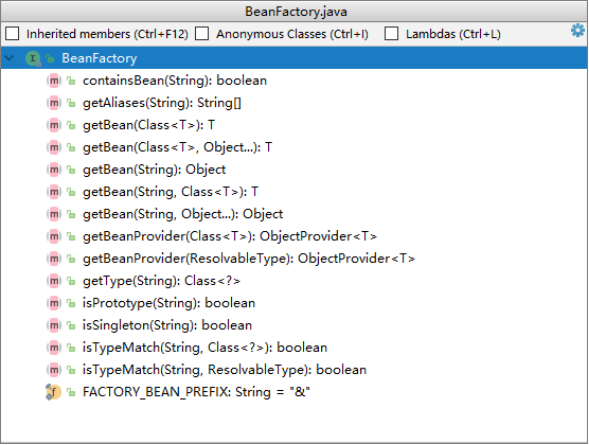
BeanFactory 容器继承体系
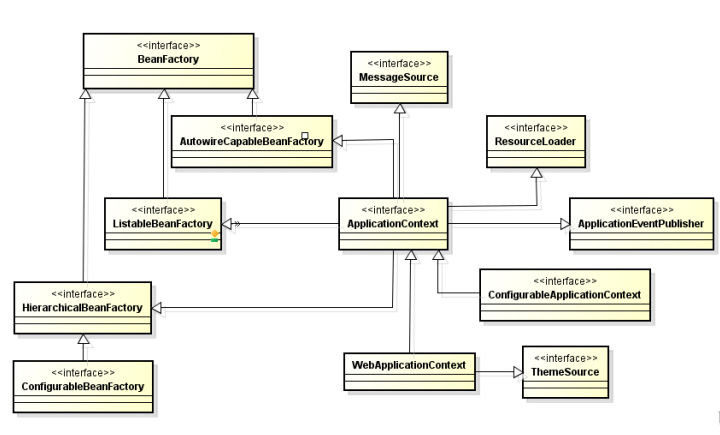
通过其接⼝设计,我们可以看到我们⼀贯使⽤的 ApplicationContext 除了继承BeanFactory的⼦接⼝, 还继承了ResourceLoader、MessageSource等接⼝,因此其提供的功能也就更丰富了。
2.2 bean生命周期关键时间点
准备代码: ExampleBean
public class ExampleBean implements InitializingBean {
public ExampleBean() {
System.out.println("ExampleBean.....constructor");
}
@Override
public void afterPropertiesSet() throws Exception {
System.out.println("ExampleBean.....afterPropertiesSet");
}
}
MyBeanPostProcessor
public class MyBeanPostProcessor implements BeanPostProcessor {
public MyBeanPostProcessor() {
System.out.println("MyBeanPostProcessor.....constructor");
}
@Override
public Object postProcessBeforeInitialization(Object bean, String beanName) throws BeansException {
if (beanName.equalsIgnoreCase("exampleBean")) {
System.out.println("exampleBean 初始化之前的后置处理器");
}
return bean;
}
@Override
public Object postProcessAfterInitialization(Object bean, String beanName) throws BeansException {
if (beanName.equalsIgnoreCase("exampleBean")) {
System.out.println("exampleBean 初始化之后的后置处理器");
}
return bean;
}
}
MyBeanFactoryPostProcessor
public class MyBeanFactoryPostProcessor implements BeanFactoryPostProcessor {
public MyBeanFactoryPostProcessor() {
System.out.println("MyBeanFactoryPostProcessor.....constructor");
}
@Override
public void postProcessBeanFactory(ConfigurableListableBeanFactory beanFactory) throws BeansException {
System.out.println("MyBeanFactoryPostProcessor.....postProcessBeanFactory");
}
}
applicationContext.xml
<?xml version="1.0" encoding="UTF-8"?>
<beans xmlns="http://www.springframework.org/schema/beans"
xmlns:xsi="http://www.w3.org/2001/XMLSchema-instance"
xsi:schemaLocation="
http://www.springframework.org/schema/beans
https://www.springframework.org/schema/beans/spring-beans.xsd
">
<bean id="exampleBean" class="com.example.bean.ExampleBean"></bean>
<bean id="myBeanPostProcessor" class="com.example.processor.MyBeanPostProcessor"></bean>
<bean id="myBeanFactoryPostProcessor" class="com.example.processor.MyBeanFactoryPostProcessor"></bean>
</beans>
测试类
public class IocTest {
@Test
public void test01() {
ApplicationContext applicationContext = new ClassPathXmlApplicationContext("classpath:applicationContext.xml");
ExampleBean bean = applicationContext.getBean(ExampleBean.class);
System.out.println(bean);
}
}
分别在ExampleBean、MyBeanFactoryPostProcessor、MyBeanPostProcessor中的构造方法和后置处理器中打上断点进行调试,观察调用栈:
- bean的构造函数的调用是在AbstractApplicationContext类refresh⽅法的finishBeanFactoryInitialization(beanFactory)处;
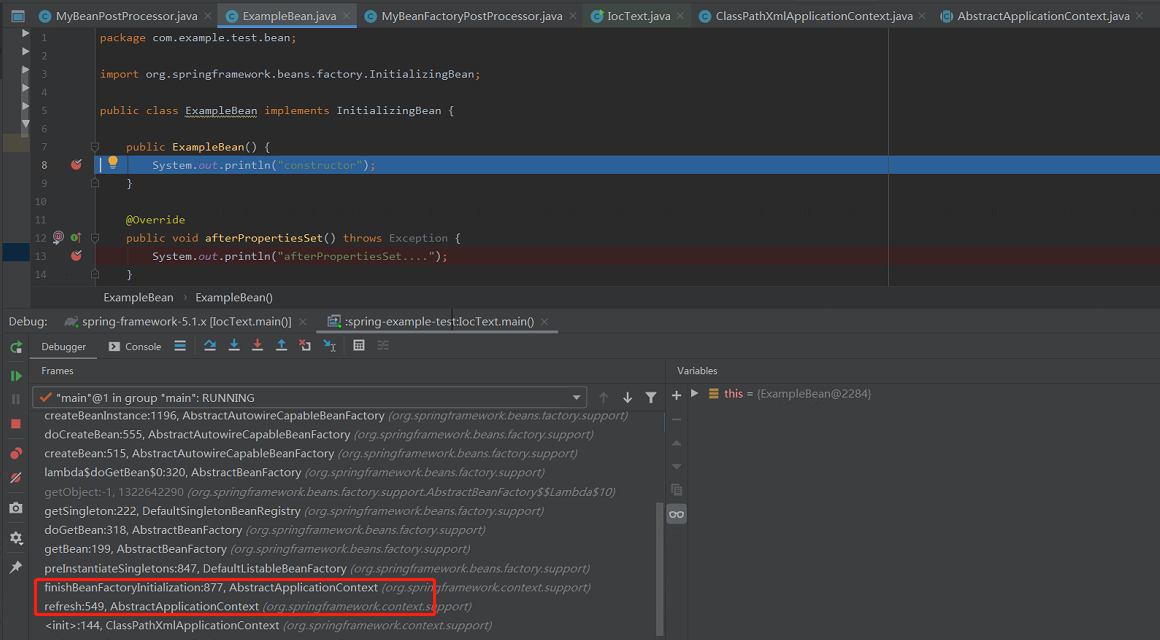
- InitializingBean中afterPropertiesSet ⽅法的调⽤时机也是在AbstractApplicationContext类refresh⽅法的finishBeanFactoryInitialization(beanFactory);
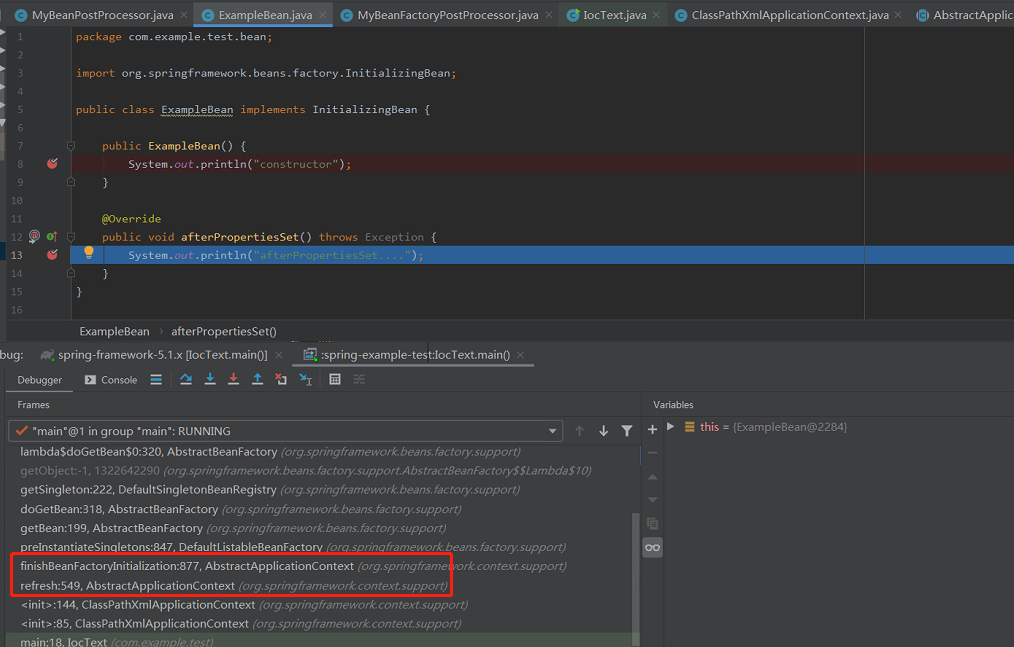
- BeanPostProcessor的构造方法是在AbstractApplicationContext类refresh⽅法中的registerBeanPostProcessors()中调用的
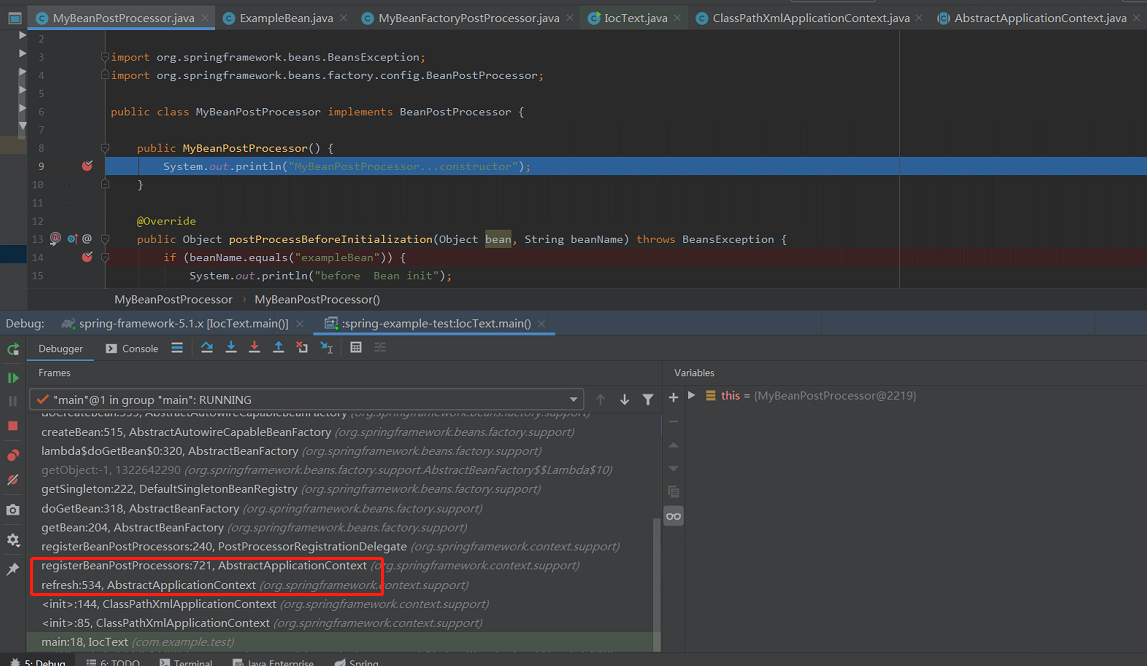
- BeanPostProcessor的postProcessorBeforeInitialization()也是在AbstractApplicationContext类refresh⽅法的finishBeanFactoryInitialization(beanFactory)处;
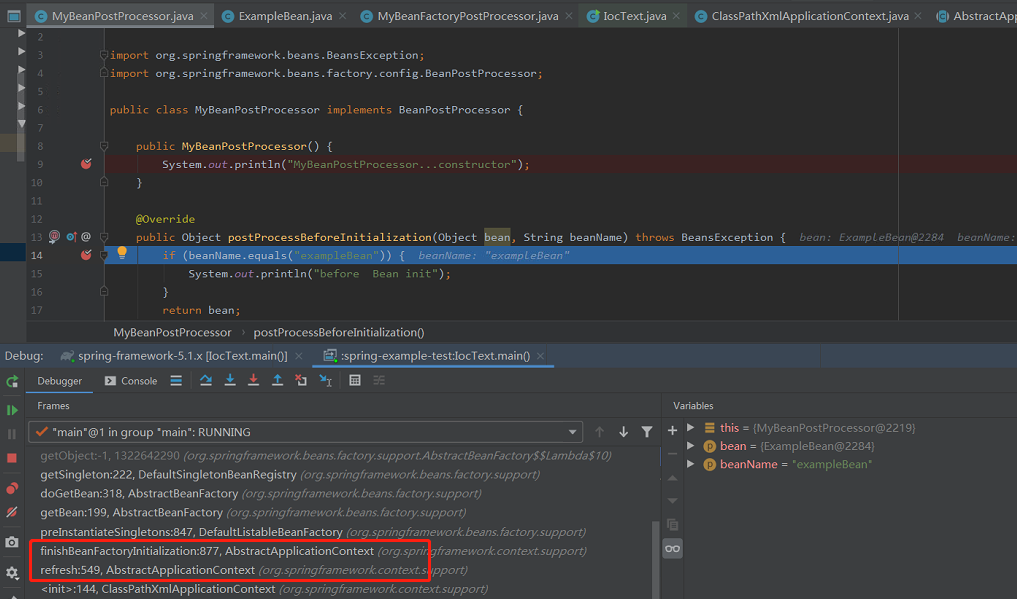
- BeanPostProcessor的postProcessorAfterInitialization()也是在AbstractApplicationContext类refresh⽅法的finishBeanFactoryInitialization(beanFactory)处;
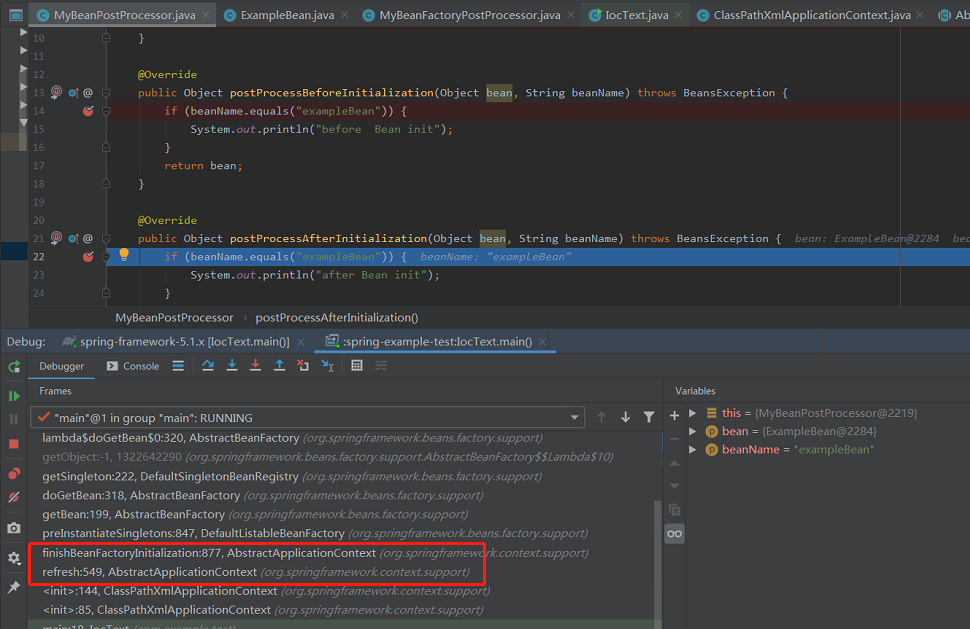
- BeanFactoryPostProcessor的构造方法在AbstractApplicationContext类refresh⽅法中的invokeBeanFactoryPostProcessors()中调用
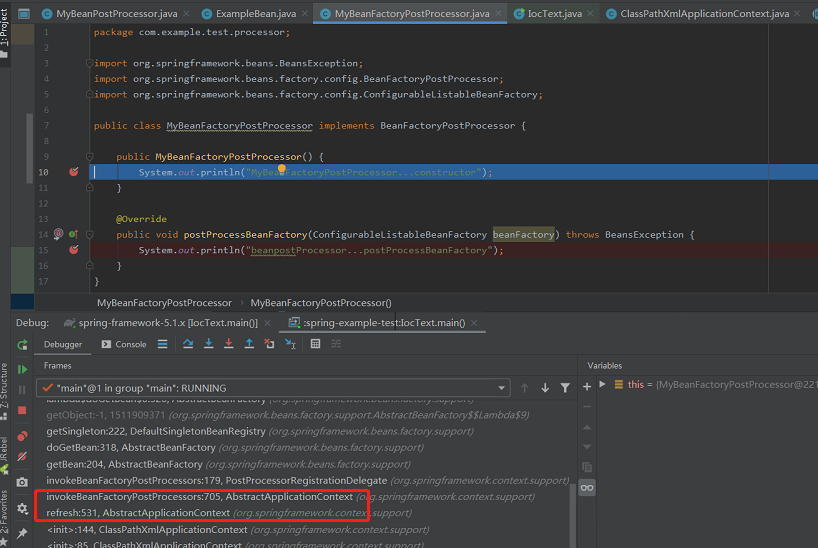
- BeanFactoryPostProcessor的postProcessBeanFactory()方法也是在AbstractApplicationContext类refresh方法中的invokeBeanFactoryPostProcessors()调用
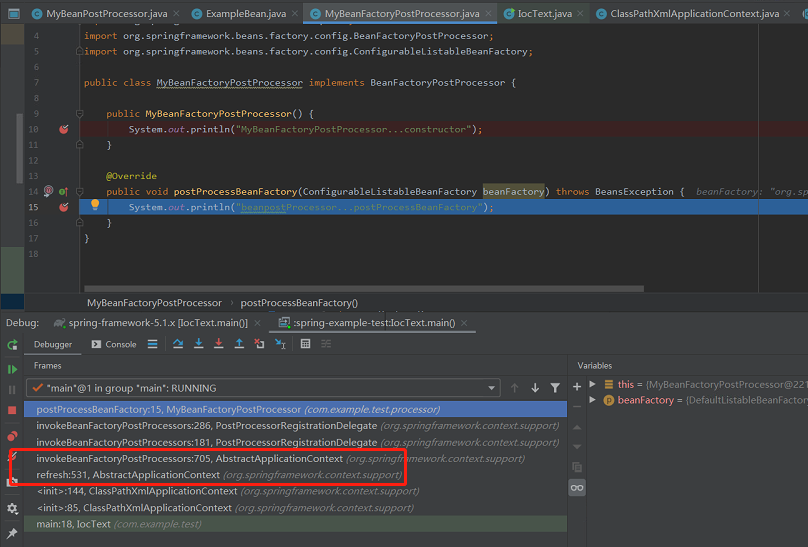
- 总结: 根据上⾯的调试分析,我们发现 Bean对象创建的⼏个关键时机点代码层级的调⽤都在AbstractApplicationContext 类 的 refresh ⽅法中,可⻅这个⽅法对于Spring IoC 容器初始化来说相当关键。 汇总如下:
| 关键点 | 触发代码 |
|---|---|
| 构造函数 | refresh#finishBeanFactoryInitialization(beanFactory)(beanFactory) |
| BeanFactoryPostProcessor 初始化 | refresh#invokeBeanFactoryPostProcessors(beanFactory) |
| BeanFactoryPostProcessor ⽅法调⽤ | refresh#invokeBeanFactoryPostProcessors(beanFactory) |
| BeanPostProcessor 初始化 | refresh#registerBeanPostProcessors(beanFactory) |
| BeanPostProcessor ⽅法调⽤ | refresh#finishBeanFactoryInitialization(beanFactory) |
2.3 分析AbstractApplicationContext中的refresh()
@Override
@Override
public void refresh() throws BeansException, IllegalStateException {
synchronized (this.startupShutdownMonitor) {
// Prepare this context for refreshing.
prepareRefresh();
// Tell the subclass to refresh the internal bean factory.
ConfigurableListableBeanFactory beanFactory = obtainFreshBeanFactory();
// Prepare the bean factory for use in this context.
// 设置BeanFactory基本属性
prepareBeanFactory(beanFactory);
try {
// Allows post-processing of the bean factory in context subclasses.
// 注册BeanFactory后置处理器
postProcessBeanFactory(beanFactory);
// Invoke factory processors registered as beans in the context.
// 初始化并执行BeanFactory后置处理器
invokeBeanFactoryPostProcessors(beanFactory);
// Register bean processors that intercept bean creation.
// 实例化并注册各种类型的和自定义的Bean后置处理器
registerBeanPostProcessors(beanFactory);
// Initialize message source for this context.
initMessageSource();
// Initialize event multicaster for this context.
initApplicationEventMulticaster();
// Initialize other special beans in specific context subclasses.
// 初始化其他bean 扩展
onRefresh();
// Check for listener beans and register them.
// 注册监听器
registerListeners();
// Instantiate all remaining (non-lazy-init) singletons.
// 实例化所有单实例的、非延迟加载的bean
// 调用class的构造初始化,并执行所有的后置处理器
finishBeanFactoryInitialization(beanFactory);
// Last step: publish corresponding event.
// 完成刷新 发布事件
finishRefresh();
}
catch (BeansException ex) {
if (logger.isWarnEnabled()) {
logger.warn("Exception encountered during context initialization - " +
"cancelling refresh attempt: " + ex);
}
// Destroy already created singletons to avoid dangling resources.
destroyBeans();
// Reset 'active' flag.
cancelRefresh(ex);
// Propagate exception to caller.
throw ex;
}
finally {
// Reset common introspection caches in Spring's core, since we
// might not ever need metadata for singleton beans anymore...
resetCommonCaches();
}
}
}
2.3.1 准备刷新容器prepareRefresh()
/**
* Prepare this context for refreshing, setting its startup date and
* active flag as well as performing any initialization of property sources.
*/
protected void prepareRefresh() {
// Switch to active.
// 设置启动时间
this.startupDate = System.currentTimeMillis();
// 设置关闭状态
this.closed.set(false);
// 设置激活状态
this.active.set(true);
if (logger.isDebugEnabled()) {
if (logger.isTraceEnabled()) {
logger.trace("Refreshing " + this);
}
else {
logger.debug("Refreshing " + getDisplayName());
}
}
// Initialize any placeholder property sources in the context environment.
// 初始化参数 扩展使用
initPropertySources();
// Validate that all properties marked as required are resolvable:
// see ConfigurablePropertyResolver#setRequiredProperties
// 校验必须的属性
getEnvironment().validateRequiredProperties();
// Store pre-refresh ApplicationListeners...
if (this.earlyApplicationListeners == null) {
this.earlyApplicationListeners = new LinkedHashSet<>(this.applicationListeners);
}
else {
// Reset local application listeners to pre-refresh state.
this.applicationListeners.clear();
this.applicationListeners.addAll(this.earlyApplicationListeners);
}
// Allow for the collection of early ApplicationEvents,
// to be published once the multicaster is available...
this.earlyApplicationEvents = new LinkedHashSet<>();
}
2.3.2 创建获取容器obtainFreshBeanFactory()
protected ConfigurableListableBeanFactory obtainFreshBeanFactory() {
// 创建容器
refreshBeanFactory();
// 获取容器
return getBeanFactory();
}
/**
* This implementation performs an actual refresh of this context's underlying
* bean factory, shutting down the previous bean factory (if any) and
* initializing a fresh bean factory for the next phase of the context's lifecycle.
*/
@Override
protected final void refreshBeanFactory() throws BeansException {
// 判断当前是否存在容器
if (hasBeanFactory()) {
// 先销毁所有的bean
destroyBeans();
// 再关闭容器
closeBeanFactory();
}
try {
// 创建容器
DefaultListableBeanFactory beanFactory = createBeanFactory();
// 设置序列id
beanFactory.setSerializationId(getId());
// 设置容器参数: 是否允许BeanDefinition覆盖、是否允许循环依赖
customizeBeanFactory(beanFactory);
// 解析xml或者注解,获取所有的BeanDefinition
loadBeanDefinitions(beanFactory);
synchronized (this.beanFactoryMonitor) {
this.beanFactory = beanFactory;
}
}
catch (IOException ex) {
throw new ApplicationContextException("I/O error parsing bean definition source for " + getDisplayName(), ex);
}
}
@Override
public final ConfigurableListableBeanFactory getBeanFactory() {
synchronized (this.beanFactoryMonitor) {
if (this.beanFactory == null) {
throw new IllegalStateException("BeanFactory not initialized or already closed - " +
"call 'refresh' before accessing beans via the ApplicationContext");
}
return this.beanFactory;
}
}
2.3.3 设置基本属性perpareBeanFactory
/**
* Configure the factory's standard context characteristics,
* such as the context's ClassLoader and post-processors.
* @param beanFactory the BeanFactory to configure
*/
protected void prepareBeanFactory(ConfigurableListableBeanFactory beanFactory) {
// Tell the internal bean factory to use the context's class loader etc.
beanFactory.setBeanClassLoader(getClassLoader());
beanFactory.setBeanExpressionResolver(new StandardBeanExpressionResolver(beanFactory.getBeanClassLoader()));
beanFactory.addPropertyEditorRegistrar(new ResourceEditorRegistrar(this, getEnvironment()));
// Configure the bean factory with context callbacks.
beanFactory.addBeanPostProcessor(new ApplicationContextAwareProcessor(this));
beanFactory.ignoreDependencyInterface(EnvironmentAware.class);
beanFactory.ignoreDependencyInterface(EmbeddedValueResolverAware.class);
beanFactory.ignoreDependencyInterface(ResourceLoaderAware.class);
beanFactory.ignoreDependencyInterface(ApplicationEventPublisherAware.class);
beanFactory.ignoreDependencyInterface(MessageSourceAware.class);
beanFactory.ignoreDependencyInterface(ApplicationContextAware.class);
// BeanFactory interface not registered as resolvable type in a plain factory.
// MessageSource registered (and found for autowiring) as a bean.
beanFactory.registerResolvableDependency(BeanFactory.class, beanFactory);
beanFactory.registerResolvableDependency(ResourceLoader.class, this);
beanFactory.registerResolvableDependency(ApplicationEventPublisher.class, this);
beanFactory.registerResolvableDependency(ApplicationContext.class, this);
// Register early post-processor for detecting inner beans as ApplicationListeners.
beanFactory.addBeanPostProcessor(new ApplicationListenerDetector(this));
// Detect a LoadTimeWeaver and prepare for weaving, if found.
if (beanFactory.containsBean(LOAD_TIME_WEAVER_BEAN_NAME)) {
beanFactory.addBeanPostProcessor(new LoadTimeWeaverAwareProcessor(beanFactory));
// Set a temporary ClassLoader for type matching.
beanFactory.setTempClassLoader(new ContextTypeMatchClassLoader(beanFactory.getBeanClassLoader()));
}
// Register default environment beans.
if (!beanFactory.containsLocalBean(ENVIRONMENT_BEAN_NAME)) {
beanFactory.registerSingleton(ENVIRONMENT_BEAN_NAME, getEnvironment());
}
if (!beanFactory.containsLocalBean(SYSTEM_PROPERTIES_BEAN_NAME)) {
beanFactory.registerSingleton(SYSTEM_PROPERTIES_BEAN_NAME, getEnvironment().getSystemProperties());
}
if (!beanFactory.containsLocalBean(SYSTEM_ENVIRONMENT_BEAN_NAME)) {
beanFactory.registerSingleton(SYSTEM_ENVIRONMENT_BEAN_NAME, getEnvironment().getSystemEnvironment());
}
}
2.3.4 注册BeanFactory后置处理器,包括自定义BeanFactory后置处理器 postProcessBeanFactory()
/**
* Modify the application context's internal bean factory after its standard
* initialization. All bean definitions will have been loaded, but no beans
* will have been instantiated yet. This allows for registering special
* BeanPostProcessors etc in certain ApplicationContext implementations. //
* @param beanFactory the bean factory used by the application context
*/
protected void postProcessBeanFactory(ConfigurableListableBeanFactory beanFactory) {
}
/**
* Register request/session scopes, a {@link ServletContextAwareProcessor}, etc.
*/
@Override
protected void postProcessBeanFactory(ConfigurableListableBeanFactory beanFactory) {
beanFactory.addBeanPostProcessor(new ServletContextAwareProcessor(this.servletContext, this.servletConfig));
beanFactory.ignoreDependencyInterface(ServletContextAware.class);
beanFactory.ignoreDependencyInterface(ServletConfigAware.class);
WebApplicationContextUtils.registerWebApplicationScopes(beanFactory, this.servletContext);
WebApplicationContextUtils.registerEnvironmentBeans(beanFactory, this.servletContext, this.servletConfig);
}
2.3.5 实例化并调用所有已注册的BeanFactoryPostProcessor Bean
/**
* Instantiate and invoke all registered BeanFactoryPostProcessor beans,
* respecting explicit order if given.
* <p>Must be called before singleton instantiation.
*/
protected void invokeBeanFactoryPostProcessors(ConfigurableListableBeanFactory beanFactory) {
PostProcessorRegistrationDelegate.invokeBeanFactoryPostProcessors(beanFactory, getBeanFactoryPostProcessors());
// Detect a LoadTimeWeaver and prepare for weaving, if found in the meantime
// (e.g. through an @Bean method registered by ConfigurationClassPostProcessor)
if (beanFactory.getTempClassLoader() == null && beanFactory.containsBean(LOAD_TIME_WEAVER_BEAN_NAME)) {
beanFactory.addBeanPostProcessor(new LoadTimeWeaverAwareProcessor(beanFactory));
beanFactory.setTempClassLoader(new ContextTypeMatchClassLoader(beanFactory.getBeanClassLoader()));
}
}
2.3.6 实例化并注册各种类型的和自定义的Bean后置处理器registerBeanPostProcessors(beanFactory)
/**
* Instantiate and register all BeanPostProcessor beans,
* respecting explicit order if given.
* <p>Must be called before any instantiation of application beans.
*/
protected void registerBeanPostProcessors(ConfigurableListableBeanFactory beanFactory) {
PostProcessorRegistrationDelegate.registerBeanPostProcessors(beanFactory, this);
}
2.3.7 实例化所有单实例的、非延迟加载的bean finishBeanFactoryInitialization(beanFactory)
/**
* Finish the initialization of this context's bean factory,
* initializing all remaining singleton beans.
*/
protected void finishBeanFactoryInitialization(ConfigurableListableBeanFactory beanFactory) {
// Initialize conversion service for this context.
// 初始化转换服务
if (beanFactory.containsBean(CONVERSION_SERVICE_BEAN_NAME) &&
beanFactory.isTypeMatch(CONVERSION_SERVICE_BEAN_NAME, ConversionService.class)) {
beanFactory.setConversionService(
beanFactory.getBean(CONVERSION_SERVICE_BEAN_NAME, ConversionService.class));
}
// Register a default embedded value resolver if no bean post-processor
// (such as a PropertyPlaceholderConfigurer bean) registered any before:
// at this point, primarily for resolution in annotation attribute values.
//如果之前没有任何bean后处理器(例如PropertyPlaceholderConfigurer Bean)之前进行过注册,请注册一个默认的嵌入式值解析器,主要用于注释属性值的解析
if (!beanFactory.hasEmbeddedValueResolver()) {
beanFactory.addEmbeddedValueResolver(strVal -> getEnvironment().resolvePlaceholders(strVal));
}
// Initialize LoadTimeWeaverAware beans early to allow for registering their transformers early.
// 尽早初始化LoadTimeWeaverAware Bean,以便尽早注册其转换器
String[] weaverAwareNames = beanFactory.getBeanNamesForType(LoadTimeWeaverAware.class, false, false);
for (String weaverAwareName : weaverAwareNames) {
getBean(weaverAwareName);
}
// Stop using the temporary ClassLoader for type matching.
// 停止使用临时的ClassLoader进行类型匹配
beanFactory.setTempClassLoader(null);
// Allow for caching all bean definition metadata, not expecting further changes.
// 允许缓存所有bean定义元数据,不希望有进一步的更改
beanFactory.freezeConfiguration();
// Instantiate all remaining (non-lazy-init) singletons.
// 初始化
beanFactory.preInstantiateSingletons();
}
2.3.8 preInstantiateSingletons()
@Override
public void preInstantiateSingletons() throws BeansException {
if (logger.isTraceEnabled()) {
logger.trace("Pre-instantiating singletons in " + this);
}
// Iterate over a copy to allow for init methods which in turn register new bean definitions.
// While this may not be part of the regular factory bootstrap, it does otherwise work fine.
List<String> beanNames = new ArrayList<>(this.beanDefinitionNames);
// Trigger initialization of all non-lazy singleton beans...
for (String beanName : beanNames) {
RootBeanDefinition bd = getMergedLocalBeanDefinition(beanName);
// 判断是否是 非抽象的 单例的 非懒加载的
if (!bd.isAbstract() && bd.isSingleton() && !bd.isLazyInit()) {
// 判断是否是获取FactoryBean的Bean
if (isFactoryBean(beanName)) {
// bean 的name前加上 & 符号 ,代表获取FactoryBean
Object bean = getBean(FACTORY_BEAN_PREFIX + beanName);
if (bean instanceof FactoryBean) {
final FactoryBean<?> factory = (FactoryBean<?>) bean;
boolean isEagerInit;
if (System.getSecurityManager() != null && factory instanceof SmartFactoryBean) {
isEagerInit = AccessController.doPrivileged((PrivilegedAction<Boolean>)
((SmartFactoryBean<?>) factory)::isEagerInit,
getAccessControlContext());
}
else {
isEagerInit = (factory instanceof SmartFactoryBean &&
((SmartFactoryBean<?>) factory).isEagerInit());
}
if (isEagerInit) {
getBean(beanName);
}
}
}
else {
// 获取bean
getBean(beanName);
}
}
}
// Trigger post-initialization callback for all applicable beans...
// 初始化后回调
for (String beanName : beanNames) {
Object singletonInstance = getSingleton(beanName);
if (singletonInstance instanceof SmartInitializingSingleton) {
final SmartInitializingSingleton smartSingleton = (SmartInitializingSingleton) singletonInstance;
if (System.getSecurityManager() != null) {
AccessController.doPrivileged((PrivilegedAction<Object>) () -> {
smartSingleton.afterSingletonsInstantiated();
return null;
}, getAccessControlContext());
}
else {
smartSingleton.afterSingletonsInstantiated();
}
}
}
}
2.3.9 getBean()
@Override
public Object getBean(String name) throws BeansException {
return doGetBean(name, null, null, false);
}
2.3.10 doGetBean(name, null, null, false)
/**
* Return an instance, which may be shared or independent, of the specified bean.
* @param name the name of the bean to retrieve
* @param requiredType the required type of the bean to retrieve
* @param args arguments to use when creating a bean instance using explicit arguments
* (only applied when creating a new instance as opposed to retrieving an existing one)
* @param typeCheckOnly whether the instance is obtained for a type check,
* not for actual use
* @return an instance of the bean
* @throws BeansException if the bean could not be created
*/
@SuppressWarnings("unchecked")
protected <T> T doGetBean(final String name, @Nullable final Class<T> requiredType,
@Nullable final Object[] args, boolean typeCheckOnly) throws BeansException {
// 检验Bean的name 如果是以&开头 截取&后边的内容
final String beanName = transformedBeanName(name);
Object bean;
// Eagerly check singleton cache for manually registered singletons.
// 从缓存中通过beanName获取bean 如果缓存中存在,类型转换后直接返回
Object sharedInstance = getSingleton(beanName);
if (sharedInstance != null && args == null) {
if (logger.isTraceEnabled()) {
if (isSingletonCurrentlyInCreation(beanName)) {
logger.trace("Returning eagerly cached instance of singleton bean '" + beanName +
"' that is not fully initialized yet - a consequence of a circular reference");
}
else {
logger.trace("Returning cached instance of singleton bean '" + beanName + "'");
}
}
bean = getObjectForBeanInstance(sharedInstance, name, beanName, null);
}
else {
// Fail if we're already creating this bean instance:
// We're assumably within a circular reference.
// 判断是否已经创建
if (isPrototypeCurrentlyInCreation(beanName)) {
throw new BeanCurrentlyInCreationException(beanName);
}
// Check if bean definition exists in this factory.
// 判断是否已经创建
BeanFactory parentBeanFactory = getParentBeanFactory();
if (parentBeanFactory != null && !containsBeanDefinition(beanName)) {
// Not found -> check parent.
String nameToLookup = originalBeanName(name);
if (parentBeanFactory instanceof AbstractBeanFactory) {
return ((AbstractBeanFactory) parentBeanFactory).doGetBean(
nameToLookup, requiredType, args, typeCheckOnly);
}
else if (args != null) {
// Delegation to parent with explicit args.
return (T) parentBeanFactory.getBean(nameToLookup, args);
}
else if (requiredType != null) {
// No args -> delegate to standard getBean method.
return parentBeanFactory.getBean(nameToLookup, requiredType);
}
else {
return (T) parentBeanFactory.getBean(nameToLookup);
}
}
// 添加转换标记
if (!typeCheckOnly) {
markBeanAsCreated(beanName);
}
try {
final RootBeanDefinition mbd = getMergedLocalBeanDefinition(beanName);
// 对BeanDefinition进行检查 如果是abstract 抛出异常
checkMergedBeanDefinition(mbd, beanName, args);
// Guarantee initialization of beans that the current bean depends on.
// 保证当前bean依赖的bean的初始化
String[] dependsOn = mbd.getDependsOn();
if (dependsOn != null) {
for (String dep : dependsOn) {
if (isDependent(beanName, dep)) {
throw new BeanCreationException(mbd.getResourceDescription(), beanName,
"Circular depends-on relationship between '" + beanName + "' and '" + dep + "'");
}
// 注册依赖的bean
registerDependentBean(dep, beanName);
try {
getBean(dep);
}
catch (NoSuchBeanDefinitionException ex) {
throw new BeanCreationException(mbd.getResourceDescription(), beanName,
"'" + beanName + "' depends on missing bean '" + dep + "'", ex);
}
}
}
// Create bean instance.
// 创建bean
if (mbd.isSingleton()) {
// 返回一个beanName的单例对象,如果未创建,则创建一个
sharedInstance = getSingleton(beanName, () -> {
try {
// 创建对象
return createBean(beanName, mbd, args);
}
catch (BeansException ex) {
// Explicitly remove instance from singleton cache: It might have been put there
// eagerly by the creation process, to allow for circular reference resolution.
// Also remove any beans that received a temporary reference to the bean.
destroySingleton(beanName);
throw ex;
}
});
bean = getObjectForBeanInstance(sharedInstance, name, beanName, mbd);
}
// 创建多例bean
else if (mbd.isPrototype()) {
// It's a prototype -> create a new instance.
Object prototypeInstance = null;
try {
beforePrototypeCreation(beanName);
prototypeInstance = createBean(beanName, mbd, args);
}
finally {
afterPrototypeCreation(beanName);
}
bean = getObjectForBeanInstance(prototypeInstance, name, beanName, mbd);
}
// 非单例或者多例 其他类型的bean
else {
String scopeName = mbd.getScope();
final Scope scope = this.scopes.get(scopeName);
if (scope == null) {
throw new IllegalStateException("No Scope registered for scope name '" + scopeName + "'");
}
try {
Object scopedInstance = scope.get(beanName, () -> {
beforePrototypeCreation(beanName);
try {
return createBean(beanName, mbd, args);
}
finally {
afterPrototypeCreation(beanName);
}
});
bean = getObjectForBeanInstance(scopedInstance, name, beanName, mbd);
}
catch (IllegalStateException ex) {
throw new BeanCreationException(beanName,
"Scope '" + scopeName + "' is not active for the current thread; consider " +
"defining a scoped proxy for this bean if you intend to refer to it from a singleton",
ex);
}
}
}
catch (BeansException ex) {
cleanupAfterBeanCreationFailure(beanName);
throw ex;
}
}
// Check if required type matches the type of the actual bean instance.
// 类型转换 如果需要,将Object转换为具体的类
if (requiredType != null && !requiredType.isInstance(bean)) {
try {
T convertedBean = getTypeConverter().convertIfNecessary(bean, requiredType);
if (convertedBean == null) {
throw new BeanNotOfRequiredTypeException(name, requiredType, bean.getClass());
}
return convertedBean;
}
catch (TypeMismatchException ex) {
if (logger.isTraceEnabled()) {
logger.trace("Failed to convert bean '" + name + "' to required type '" +
ClassUtils.getQualifiedName(requiredType) + "'", ex);
}
throw new BeanNotOfRequiredTypeException(name, requiredType, bean.getClass());
}
}
return (T) bean;
}
2.3.11 获取单例bean getSingleton(beanName)
@Override
@Nullable
public Object getSingleton(String beanName) {
return getSingleton(beanName, true);
}
/**
* Return the (raw) singleton object registered under the given name.
* <p>Checks already instantiated singletons and also allows for an early
* reference to a currently created singleton (resolving a circular reference).
* @param beanName the name of the bean to look for
* @param allowEarlyReference whether early references should be created or not
* @return the registered singleton object, or {@code null} if none found
*/
@Nullable
protected Object getSingleton(String beanName, boolean allowEarlyReference) {
// 一级缓存中获取
Object singletonObject = this.singletonObjects.get(beanName);
if (singletonObject == null && isSingletonCurrentlyInCreation(beanName)) {
synchronized (this.singletonObjects) {
// 二级缓存中获取
singletonObject = this.earlySingletonObjects.get(beanName);
if (singletonObject == null && allowEarlyReference) {
// 三级缓存中获取
ObjectFactory<?> singletonFactory = this.singletonFactories.get(beanName);
if (singletonFactory != null) {
// 为当前实例生成代理类
singletonObject = singletonFactory.getObject();
// 存放在二级缓存中
this.earlySingletonObjects.put(beanName, singletonObject);
// 从三级缓存中删除
this.singletonFactories.remove(beanName);
}
}
}
}
return singletonObject;
}
2.3.12 getSingleton()
/**
* Return the (raw) singleton object registered under the given name,
* creating and registering a new one if none registered yet.
* @param beanName the name of the bean
* @param singletonFactory the ObjectFactory to lazily create the singleton
* with, if necessary
* @return the registered singleton object
*/
public Object getSingleton(String beanName, ObjectFactory<?> singletonFactory) {
Assert.notNull(beanName, "Bean name must not be null");
synchronized (this.singletonObjects) {
// 一级缓存中获取
Object singletonObject = this.singletonObjects.get(beanName);
if (singletonObject == null) {
if (this.singletonsCurrentlyInDestruction) {
throw new BeanCreationNotAllowedException(beanName,
"Singleton bean creation not allowed while singletons of this factory are in destruction " +
"(Do not request a bean from a BeanFactory in a destroy method implementation!)");
}
if (logger.isDebugEnabled()) {
logger.debug("Creating shared instance of singleton bean '" + beanName + "'");
}
beforeSingletonCreation(beanName);
boolean newSingleton = false;
boolean recordSuppressedExceptions = (this.suppressedExceptions == null);
if (recordSuppressedExceptions) {
this.suppressedExceptions = new LinkedHashSet<>();
}
try {
// 调用创建对象的回调 返回一个单例对象
singletonObject = singletonFactory.getObject();
newSingleton = true;
}
catch (IllegalStateException ex) {
// Has the singleton object implicitly appeared in the meantime ->
// if yes, proceed with it since the exception indicates that state.
singletonObject = this.singletonObjects.get(beanName);
if (singletonObject == null) {
throw ex;
}
}
catch (BeanCreationException ex) {
if (recordSuppressedExceptions) {
for (Exception suppressedException : this.suppressedExceptions) {
ex.addRelatedCause(suppressedException);
}
}
throw ex;
}
finally {
if (recordSuppressedExceptions) {
this.suppressedExceptions = null;
}
afterSingletonCreation(beanName);
}
if (newSingleton) {
// 将完整的bean添加到spring中 一级缓存singletonObjects中
addSingleton(beanName, singletonObject);
}
}
return singletonObject;
}
}
2.3.13 createBean(beanName, mbd, args)
/**
* Central method of this class: creates a bean instance,
* populates the bean instance, applies post-processors, etc.
* @see #doCreateBean
*/
@Override
protected Object createBean(String beanName, RootBeanDefinition mbd, @Nullable Object[] args)
throws BeanCreationException {
if (logger.isTraceEnabled()) {
logger.trace("Creating instance of bean '" + beanName + "'");
}
RootBeanDefinition mbdToUse = mbd;
// Make sure bean class is actually resolved at this point, and
// clone the bean definition in case of a dynamically resolved Class
// which cannot be stored in the shared merged bean definition.
// 确保此时已经解析了当前bean的class
Class<?> resolvedClass = resolveBeanClass(mbd, beanName);
if (resolvedClass != null && !mbd.hasBeanClass() && mbd.getBeanClassName() != null) {
mbdToUse = new RootBeanDefinition(mbd);
mbdToUse.setBeanClass(resolvedClass);
}
// Prepare method overrides.
try {
// 方法如果有重写,执行重写的方法
mbdToUse.prepareMethodOverrides();
}
catch (BeanDefinitionValidationException ex) {
throw new BeanDefinitionStoreException(mbdToUse.getResourceDescription(),
beanName, "Validation of method overrides failed", ex);
}
try {
// Give BeanPostProcessors a chance to return a proxy instead of the target bean instance.
// 是否需要返回一个代理对象
Object bean = resolveBeforeInstantiation(beanName, mbdToUse);
if (bean != null) {
return bean;
}
}
catch (Throwable ex) {
throw new BeanCreationException(mbdToUse.getResourceDescription(), beanName,
"BeanPostProcessor before instantiation of bean failed", ex);
}
try {
// 创建实例
Object beanInstance = doCreateBean(beanName, mbdToUse, args);
if (logger.isTraceEnabled()) {
logger.trace("Finished creating instance of bean '" + beanName + "'");
}
return beanInstance;
}
catch (BeanCreationException | ImplicitlyAppearedSingletonException ex) {
// A previously detected exception with proper bean creation context already,
// or illegal singleton state to be communicated up to DefaultSingletonBeanRegistry.
throw ex;
}
catch (Throwable ex) {
throw new BeanCreationException(
mbdToUse.getResourceDescription(), beanName, "Unexpected exception during bean creation", ex);
}
}
2.3.14 doCreateBean(beanName, mbdToUse, args)
/**
* Actually create the specified bean. Pre-creation processing has already happened
* at this point, e.g. checking {@code postProcessBeforeInstantiation} callbacks.
* <p>Differentiates between default bean instantiation, use of a
* factory method, and autowiring a constructor.
* @param beanName the name of the bean
* @param mbd the merged bean definition for the bean
* @param args explicit arguments to use for constructor or factory method invocation
* @return a new instance of the bean
* @throws BeanCreationException if the bean could not be created
* @see #instantiateBean
* @see #instantiateUsingFactoryMethod
* @see #autowireConstructor
*/
protected Object doCreateBean(final String beanName, final RootBeanDefinition mbd, final @Nullable Object[] args)
throws BeanCreationException {
// Instantiate the bean.
BeanWrapper instanceWrapper = null;
if (mbd.isSingleton()) {
// 从缓存中获取bean
instanceWrapper = this.factoryBeanInstanceCache.remove(beanName);
}
if (instanceWrapper == null) {
// 缓存中获取为空,则去创建
instanceWrapper = createBeanInstance(beanName, mbd, args);
}
// 从包装类中获取bean
final Object bean = instanceWrapper.getWrappedInstance();
// 获取bean的Class
Class<?> beanType = instanceWrapper.getWrappedClass();
if (beanType != NullBean.class) {
mbd.resolvedTargetType = beanType;
}
// Allow post-processors to modify the merged bean definition.
// 允许后置处理器修改bean
synchronized (mbd.postProcessingLock) {
if (!mbd.postProcessed) {
try {
applyMergedBeanDefinitionPostProcessors(mbd, beanType, beanName);
}
catch (Throwable ex) {
throw new BeanCreationException(mbd.getResourceDescription(), beanName,
"Post-processing of merged bean definition failed", ex);
}
mbd.postProcessed = true;
}
}
// Eagerly cache singletons to be able to resolve circular references
// even when triggered by lifecycle interfaces like BeanFactoryAware.
// ***** 用于解决循环引用,将创建好的实例放在spring三级缓存singletonFactories中
boolean earlySingletonExposure = (mbd.isSingleton() && this.allowCircularReferences &&
isSingletonCurrentlyInCreation(beanName));
if (earlySingletonExposure) {
if (logger.isTraceEnabled()) {
logger.trace("Eagerly caching bean '" + beanName +
"' to allow for resolving potential circular references");
}
// 添加到三级缓存
addSingletonFactory(beanName, () -> getEarlyBeanReference(beanName, mbd, bean));
}
// Initialize the bean instance.
// 设置属性
Object exposedObject = bean;
try {
populateBean(beanName, mbd, instanceWrapper);
exposedObject = initializeBean(beanName, exposedObject, mbd);
}
catch (Throwable ex) {
if (ex instanceof BeanCreationException && beanName.equals(((BeanCreationException) ex).getBeanName())) {
throw (BeanCreationException) ex;
}
else {
throw new BeanCreationException(
mbd.getResourceDescription(), beanName, "Initialization of bean failed", ex);
}
}
if (earlySingletonExposure) {
Object earlySingletonReference = getSingleton(beanName, false);
if (earlySingletonReference != null) {
if (exposedObject == bean) {
exposedObject = earlySingletonReference;
}
else if (!this.allowRawInjectionDespiteWrapping && hasDependentBean(beanName)) {
String[] dependentBeans = getDependentBeans(beanName);
Set<String> actualDependentBeans = new LinkedHashSet<>(dependentBeans.length);
for (String dependentBean : dependentBeans) {
if (!removeSingletonIfCreatedForTypeCheckOnly(dependentBean)) {
actualDependentBeans.add(dependentBean);
}
}
if (!actualDependentBeans.isEmpty()) {
throw new BeanCurrentlyInCreationException(beanName,
"Bean with name '" + beanName + "' has been injected into other beans [" +
StringUtils.collectionToCommaDelimitedString(actualDependentBeans) +
"] in its raw version as part of a circular reference, but has eventually been " +
"wrapped. This means that said other beans do not use the final version of the " +
"bean. This is often the result of over-eager type matching - consider using " +
"'getBeanNamesOfType' with the 'allowEagerInit' flag turned off, for example.");
}
}
}
}
// Register bean as disposable.
try {
// 是否需要指明当前bean是一次性的 一般用于多例模式
registerDisposableBeanIfNecessary(beanName, bean, mbd);
}
catch (BeanDefinitionValidationException ex) {
throw new BeanCreationException(
mbd.getResourceDescription(), beanName, "Invalid destruction signature", ex);
}
return exposedObject;
}
2.3.15 createBeanInstance(beanName, mbd, args)
/**
* Create a new instance for the specified bean, using an appropriate instantiation strategy:
* factory method, constructor autowiring, or simple instantiation.
* @param beanName the name of the bean
* @param mbd the bean definition for the bean
* @param args explicit arguments to use for constructor or factory method invocation
* @return a BeanWrapper for the new instance
* @see #obtainFromSupplier
* @see #instantiateUsingFactoryMethod
* @see #autowireConstructor
* @see #instantiateBean
*/
protected BeanWrapper createBeanInstance(String beanName, RootBeanDefinition mbd, @Nullable Object[] args) {
// Make sure bean class is actually resolved at this point.
Class<?> beanClass = resolveBeanClass(mbd, beanName);
if (beanClass != null && !Modifier.isPublic(beanClass.getModifiers()) && !mbd.isNonPublicAccessAllowed()) {
throw new BeanCreationException(mbd.getResourceDescription(), beanName,
"Bean class isn't public, and non-public access not allowed: " + beanClass.getName());
}
// 返回一个创建bean实例的回调
Supplier<?> instanceSupplier = mbd.getInstanceSupplier();
if (instanceSupplier != null) {
// 如果回调不为空,通过回调方法去创建
return obtainFromSupplier(instanceSupplier, beanName);
}
// 使用工厂方法创建
if (mbd.getFactoryMethodName() != null) {
return instantiateUsingFactoryMethod(beanName, mbd, args);
}
// Shortcut when re-creating the same bean...
boolean resolved = false;
boolean autowireNecessary = false;
if (args == null) {
synchronized (mbd.constructorArgumentLock) {
if (mbd.resolvedConstructorOrFactoryMethod != null) {
resolved = true;
autowireNecessary = mbd.constructorArgumentsResolved;
}
}
}
if (resolved) {
if (autowireNecessary) {
return autowireConstructor(beanName, mbd, null, null);
}
else {
return instantiateBean(beanName, mbd);
}
}
// Candidate constructors for autowiring?
Constructor<?>[] ctors = determineConstructorsFromBeanPostProcessors(beanClass, beanName);
if (ctors != null || mbd.getResolvedAutowireMode() == AUTOWIRE_CONSTRUCTOR ||
mbd.hasConstructorArgumentValues() || !ObjectUtils.isEmpty(args)) {
return autowireConstructor(beanName, mbd, ctors, args);
}
// Preferred constructors for default construction?
ctors = mbd.getPreferredConstructors();
if (ctors != null) {
return autowireConstructor(beanName, mbd, ctors, null);
}
// No special handling: simply use no-arg constructor.
// 不需要特殊处理,只需要使用无参构造去创建
return instantiateBean(beanName, mbd);
}
2.3.16 instantiateBean(beanName, mbd)
/**
* Create a new instance for the specified bean, using an appropriate instantiation strategy:
* factory method, constructor autowiring, or simple instantiation.
* @param beanName the name of the bean
* @param mbd the bean definition for the bean
* @param args explicit arguments to use for constructor or factory method invocation
* @return a BeanWrapper for the new instance
* @see #obtainFromSupplier
* @see #instantiateUsingFactoryMethod
* @see #autowireConstructor
* @see #instantiateBean
*/
protected BeanWrapper createBeanInstance(String beanName, RootBeanDefinition mbd, @Nullable Object[] args) {
// Make sure bean class is actually resolved at this point.
Class<?> beanClass = resolveBeanClass(mbd, beanName);
if (beanClass != null && !Modifier.isPublic(beanClass.getModifiers()) && !mbd.isNonPublicAccessAllowed()) {
throw new BeanCreationException(mbd.getResourceDescription(), beanName,
"Bean class isn't public, and non-public access not allowed: " + beanClass.getName());
}
// 返回一个创建bean实例的回调
Supplier<?> instanceSupplier = mbd.getInstanceSupplier();
if (instanceSupplier != null) {
// 如果回调不为空,通过回调方法去创建
return obtainFromSupplier(instanceSupplier, beanName);
}
// 使用工厂方法创建
if (mbd.getFactoryMethodName() != null) {
return instantiateUsingFactoryMethod(beanName, mbd, args);
}
// Shortcut when re-creating the same bean...
boolean resolved = false;
boolean autowireNecessary = false;
if (args == null) {
synchronized (mbd.constructorArgumentLock) {
if (mbd.resolvedConstructorOrFactoryMethod != null) {
resolved = true;
autowireNecessary = mbd.constructorArgumentsResolved;
}
}
}
if (resolved) {
if (autowireNecessary) {
return autowireConstructor(beanName, mbd, null, null);
}
else {
return instantiateBean(beanName, mbd);
}
}
// Candidate constructors for autowiring?
Constructor<?>[] ctors = determineConstructorsFromBeanPostProcessors(beanClass, beanName);
if (ctors != null || mbd.getResolvedAutowireMode() == AUTOWIRE_CONSTRUCTOR ||
mbd.hasConstructorArgumentValues() || !ObjectUtils.isEmpty(args)) {
return autowireConstructor(beanName, mbd, ctors, args);
}
// Preferred constructors for default construction?
ctors = mbd.getPreferredConstructors();
if (ctors != null) {
return autowireConstructor(beanName, mbd, ctors, null);
}
// No special handling: simply use no-arg constructor.
// 不需要特殊处理,只需要使用无参构造去创建
return instantiateBean(beanName, mbd);
}
2.3.17 instantiateBean(beanName, mbd)
/**
* Instantiate the given bean using its default constructor.
* @param beanName the name of the bean
* @param mbd the bean definition for the bean
* @return a BeanWrapper for the new instance
*/
protected BeanWrapper instantiateBean(final String beanName, final RootBeanDefinition mbd) {
try {
Object beanInstance;
final BeanFactory parent = this;
if (System.getSecurityManager() != null) {
beanInstance = AccessController.doPrivileged((PrivilegedAction<Object>) () ->
getInstantiationStrategy().instantiate(mbd, beanName, parent),
getAccessControlContext());
}
else {
// 调用无参构造
beanInstance = getInstantiationStrategy().instantiate(mbd, beanName, parent);
}
// 返回一个包装实例
BeanWrapper bw = new BeanWrapperImpl(beanInstance);
initBeanWrapper(bw);
return bw;
}
catch (Throwable ex) {
throw new BeanCreationException(
mbd.getResourceDescription(), beanName, "Instantiation of bean failed", ex);
}
}
3. spring循环依赖
3.1 什么是循环依赖
循环依赖其实就是循环引⽤,也就是两个或者两个以上的 Bean 互相持有对⽅,最终形成闭环。⽐如A依赖于B,B依赖于C,C⼜依赖于A。
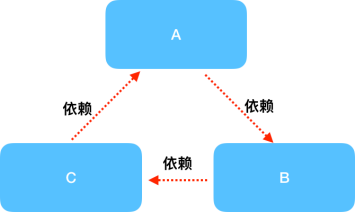
3.2 Spring中循环依赖场景有:
- 构造器的循环依赖(构造器注⼊)
- Field 属性的循环依赖(set注⼊) 其中,构造器的循环依赖问题⽆法解决,只能拋出 BeanCurrentlyInCreationException 异常,在解决属性循环依赖时,spring采⽤的是提前暴露对象的⽅法。
3.3 循环依赖处理机制
3.3.1 单例 bean 构造器参数循环依赖(⽆法解决)
3.3.2 prototype 原型 bean循环依赖(⽆法解决) Spring 不⽀持原型 bean 的循环依赖
对于原型bean的初始化过程中不论是通过构造器参数循环依赖还是通过setXxx⽅法产⽣循环依赖,Spring都 会直接报错处理。 AbstractBeanFactory.doGetBean()⽅法:
if (isPrototypeCurrentlyInCreation(beanName)) {
throw new BeanCurrentlyInCreationException(beanName);
}
protected boolean isPrototypeCurrentlyInCreation(String beanName) {
Object curVal = this.prototypesCurrentlyInCreation.get();
return (curVal != null &&
(curVal.equals(beanName) || (curVal instanceof Set && ((Set<?>)
curVal).contains(beanName))));
}
在获取bean之前如果这个原型bean正在被创建则直接抛出异常。原型bean在创建之前会进⾏标记这个beanName正在被创建,等创建结束之后会删除标记
try {
//创建原型bean之前添加标记
beforePrototypeCreation(beanName);
//创建原型bean
prototypeInstance = createBean(beanName, mbd, args);
}
finally {
//创建原型bean之后删除标记
afterPrototypeCreation(beanName);
}
3.3.3 单例bean通过setXxx或者@Autowired进⾏循环依赖
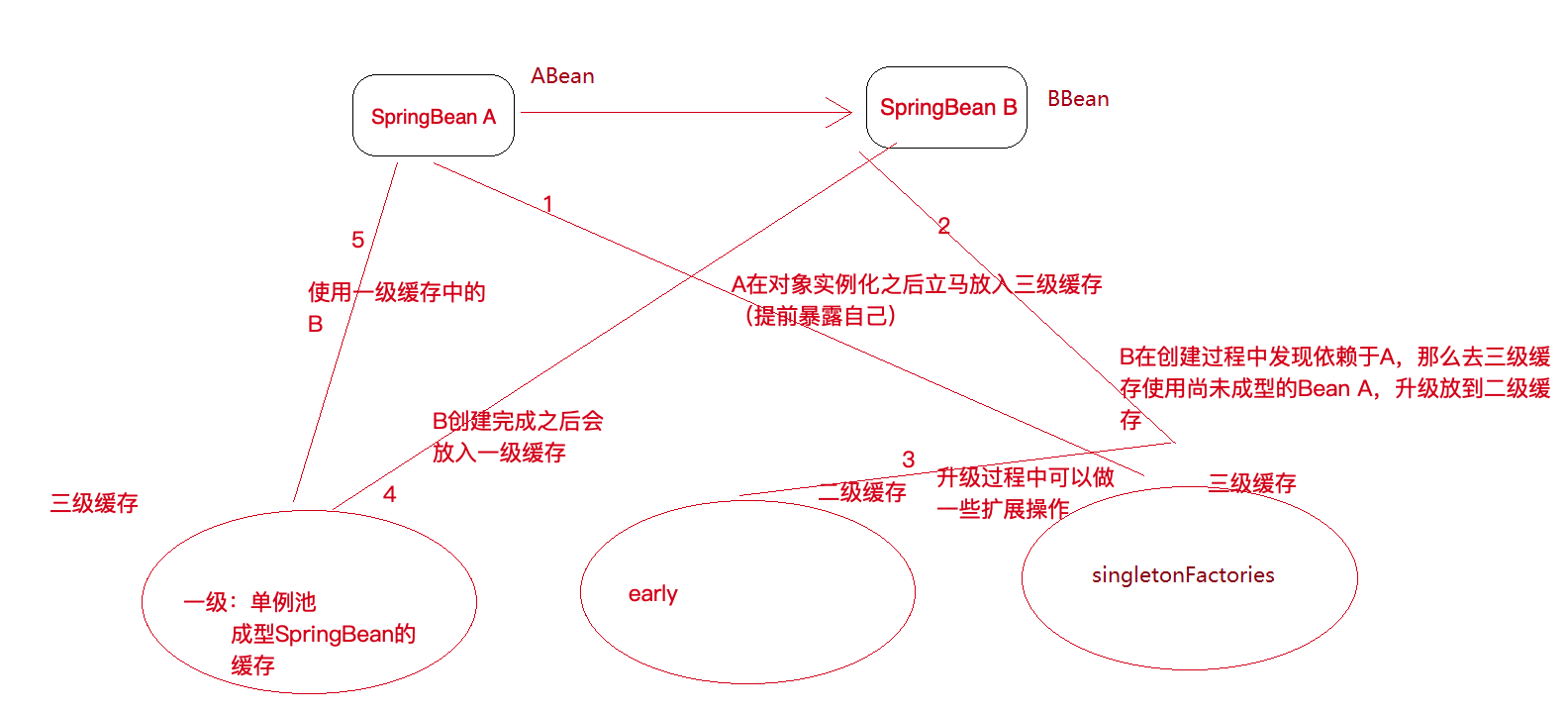
- 初始化ABean后,在AbstractAutowireCapableBeanFactory#doCreateBean中,会将实例化后的对象生成singletonFactory存放在三级缓存,当前实例只经过初始化,并没有设置属性。
// Eagerly cache singletons to be able to resolve circular references
// even when triggered by lifecycle interfaces like BeanFactoryAware.
// ***** 用于解决循环引用,将创建好的实例放在spring三级缓存singletonFactories中
boolean earlySingletonExposure = (mbd.isSingleton() && this.allowCircularReferences &&
isSingletonCurrentlyInCreation(beanName));
if (earlySingletonExposure) {
if (logger.isTraceEnabled()) {
logger.trace("Eagerly caching bean '" + beanName +
"' to allow for resolving potential circular references");
}
// 添加到三级缓存
addSingletonFactory(beanName, () -> getEarlyBeanReference(beanName, mbd, bean));
}
/**
* Add the given singleton factory for building the specified singleton
* if necessary.
* <p>To be called for eager registration of singletons, e.g. to be able to
* resolve circular references.
* @param beanName the name of the bean
* @param singletonFactory the factory for the singleton object
*/
protected void addSingletonFactory(String beanName, ObjectFactory<?> singletonFactory) {
Assert.notNull(singletonFactory, "Singleton factory must not be null");
synchronized (this.singletonObjects) {
if (!this.singletonObjects.containsKey(beanName)) {
// 存放在三级缓存
this.singletonFactories.put(beanName, singletonFactory);
this.earlySingletonObjects.remove(beanName);
this.registeredSingletons.add(beanName);
}
}
}
- 在给ABean设置属性的时候,发现ABean依赖于BBean,于是去创建BBean。
- 实例化BBean之后,去给BBean设置属性,发现BBean依赖于ABean。于是去缓存中查找ABean,此时ABean已经存在于三级缓存中。
/**
* Return the (raw) singleton object registered under the given name.
* <p>Checks already instantiated singletons and also allows for an early
* reference to a currently created singleton (resolving a circular reference).
* @param beanName the name of the bean to look for
* @param allowEarlyReference whether early references should be created or not
* @return the registered singleton object, or {@code null} if none found
*/
@Nullable
protected Object getSingleton(String beanName, boolean allowEarlyReference) {
// 一级缓存中获取
Object singletonObject = this.singletonObjects.get(beanName);
if (singletonObject == null && isSingletonCurrentlyInCreation(beanName)) {
synchronized (this.singletonObjects) {
// 二级缓存中获取
singletonObject = this.earlySingletonObjects.get(beanName);
if (singletonObject == null && allowEarlyReference) {
// 三级缓存中获取
ObjectFactory<?> singletonFactory = this.singletonFactories.get(beanName);
if (singletonFactory != null) {
// 为当前实例生成代理类
singletonObject = singletonFactory.getObject();
// 存放在二级缓存中
this.earlySingletonObjects.put(beanName, singletonObject);
// 从三级缓存中删除
this.singletonFactories.remove(beanName);
}
}
}
}
return singletonObject;
}
- 直接将ABean设置到BBean的属性中。
- BBean属性设置完后,相当于这个Bean整个流程已经创建完成,返回到给ABean设置属性这一步,将但会的BBean设置到ABean的属性中。
- ABean和BBean都完成了对象初始化操作,解决了循环依赖问题。